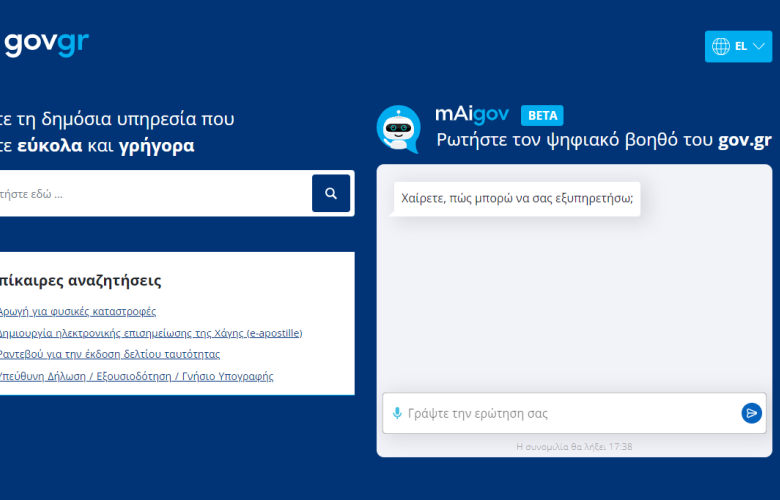In what areas is it useful?
What is needed for a residence permit in Greece? How could I travel with my pet, how can I open a business in Greece? These are some of the questions EU citizens can ask mAigov, the digital assistant gov.gr, which as of today can provide answers and directions in 25 languages (24 certified EU languages and Albanian). The presentation of the multilingual digital assistant was made today at the Ministry of Foreign Affairs by the Minister of Digital Governance, Dimitris Papastergiou and the Minister of Foreign Affairs, George Gerapetritis.
In particular, citizens from wherever they are now have the possibility to “chat” with the “Digital Assistant” in the 24 official languages of the European Union and in Albanian and to be informed about the services and administrative procedures provided. The “conversation” can be carried out from the mobile phone, tablet or computer, by submitting a question in writing or by voice. The “Digital Assistant” helps them locate the service they are looking for in a simple and friendly way, while at the end of the “conversation” they have the possibility to evaluate the application.
The Minister of Foreign Affairs, Giorgos Gerapetritis, emphasized: “Every day that the quality of the services provided to the citizen is upgraded, is an important day for the administrative system of our country. It is important today to focus on the fact that Greece, the Greek government remains on the side of the Greek, anywhere on earth. The goal of the Strategic Plan of the Ministry of Foreign Affairs for the diaspora is to bring the entire Hellenism closer to the Metropolis. We will continue to stand by the citizens because foreign policy does not only mean supporting national interests in the international arena, but also supporting Hellenism everywhere”.
For his part, the Minister of Digital Governance, Dimitris Papastergiou noted: “mAigov has held, so far, more than 300,000 dialogues and we are very happy because in the Ministry of Digital Governance we are moving forward dynamically, pioneering at the European level and contributing to the vision of Prime Minister Kyriakos Mitsotakis for an outgoing and friendly country. Now mAigov “responds” to 24 European ones languages plus Albanian, enabling expatriate Greeks, but also citizens who do not speak Greek in general, to seek information on a range of services and procedures provided by the Greek government. In collaboration with the Ministry of Foreign Affairs, our goal is to expand services for both Greek citizens and foreigners, to become a further attraction for investment, tourism, innovation. What is required is to take steady steps towards a more extroverted, brighter, more digital Greece”.
Mr. Papastergiou underlined that “it is very important for the expatriate Hellenism, for people who want to learn about Greece, to do business in Greece and are looking for a first way”. He even added that in addition to the 25 languages mAigov speaks others, such as Chinese or Arabic. As the minister pointed out, the Digital Assistant is a “new passport for all the other countries”, “it is an excellent start to now show, with the possibility of the multilingual interaction of the gov, to the outside the great work that is being done in Greece in recent years”, “it is a very good occasion to go out and show that it is a new Greece that is getting better every day”. He even pointed out that it is planned for the digital assistant to also respond vocally in any language that is asked.
It is recalled that the mAigov “Digital Assistant” search is carried out in -to date- the 1,670 services of gov.gr and the 3,296 administrative procedures of the National Register of Administrative Procedures “MITOS”. It is pointed out that the model has reasoning and answers based on the data entered. It takes into account the original question and remembers the conversation during the session, ensuring an optimal experience for each user. Since the launch of the “Digital Assistant” more than 300 thousand dialogues have taken place. These dialogues can now take place in the 24 official languages of the European Union (English, Bulgarian, French, German, Danish, Greek, Estonian, Irish, Spanish, Italian, Croatian, Latvian, Lithuanian, Maltese, Dutch, Hungarian, Polish, Portuguese , Romanian, Slovak, Slovenian, Swedish, Czech, Finnish) as well as in Albanian.




